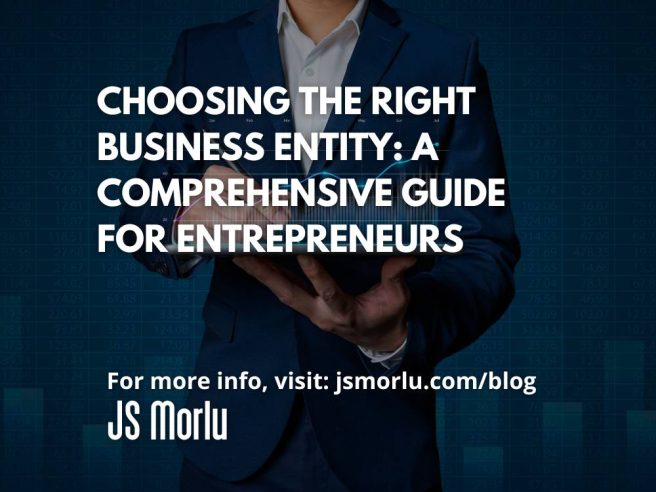Starting a business is an exciting journey filled with many crucial decisions. One of the most critical choices you will make is selecting the right business entity. This decision has far-reaching implications, affecting both your taxation and personal liability. Whether you are a sole proprietor or have multiple owners, understanding the unique pros and cons of each entity type—such as sole proprietorships, LLCs, partnerships, and corporations—is essential for making an informed choice.
In this blog post, we’ll delve into the various business entities available and help you understand which might be the best fit for your new venture.
Sole Proprietorship
A sole proprietorship is the simplest and most common structure chosen to start a business. It is an unincorporated business owned and run by one individual with no distinction between the business and the owner.
Pros:
- Easy and Inexpensive to Form: Starting a sole proprietorship is straightforward and involves minimal costs.
- Complete Control: As the sole owner, you have full control over all business decisions.
- Tax Benefits: Profits and losses are reported on your personal income tax return, simplifying the tax process.
Cons:
- Unlimited Personal Liability: You are personally responsible for all debts and obligations of the business, which can put your personal assets at risk.
- Funding Limitations: Raising capital can be challenging since you cannot sell stock and banks may be hesitant to lend to sole proprietorships.
- Longevity and Continuity: The business does not continue if you become incapacitated or die.
Limited Liability Company (LLC)
An LLC combines the pass-through taxation of a partnership or sole proprietorship with the limited liability of a corporation. It’s a popular choice for many small business owners.
Pros:
- Limited Liability: Owners (members) are typically not personally responsible for business debts and liabilities.
- Tax Flexibility: An LLC can choose to be taxed as a sole proprietorship, partnership, S-Corp, or C-Corp.
- Less Record-Keeping: Compared to corporations, LLCs have fewer annual requirements and ongoing formalities.
Cons:
- Cost: Forming and maintaining an LLC can be more expensive than a sole proprietorship or partnership due to filing fees and ongoing costs.
- State Regulations: LLCs are subject to state laws, which can vary significantly.
Partnership
A partnership involves two or more people who agree to share in the profits or losses of a business. There are two common types: General Partnerships (GP) and Limited Partnerships (LP).
Pros:
- Easy to Establish: Partnerships are relatively easy and inexpensive to set up.
- Combined Resources: Multiple owners can contribute diverse skills, experiences, and resources.
- Tax Benefits: Profits and losses are passed through to partners and reported on their personal tax returns.
Cons:
- Unlimited Liability for GPs: General partners are personally liable for business debts and obligations.
- Potential for Conflict: Differences in opinion or vision can lead to disputes among partners.
- Shared Profits: Profits must be shared among partners, which can limit the individual financial benefit.
Corporation
Corporations are more complex business structures. They are independent legal entities owned by shareholders. There are two main types: S-Corporations and C-Corporations.
Pros:
- Limited Liability: Shareholders are not personally liable for business debts and liabilities.
- Unlimited Life: The business can continue indefinitely, beyond the life of its owners.
- Ease of Raising Capital: Corporations can raise funds through the sale of stock.
Cons:
- Complexity and Cost: Forming a corporation involves more complex procedures and higher costs.
- Double Taxation for C-Corps: Profits are taxed at the corporate level and again as shareholder dividends.
- Increased Regulation: Corporations face more regulatory requirements and oversight.
Making the Right Choice
The choice of business entity should be based on various factors, including the nature of your business, the number of owners, the level of acceptable personal liability, and your taxation preferences. It’s crucial to carefully weigh the pros and cons of each option and consult with a business advisor or legal professional to ensure you make the best decision for your specific circumstances.
In our video below, we further explore these business entities and their implications.
Conclusion
Choosing the right business entity is a foundational step in setting up your business for success. Each entity type has its own advantages and disadvantages, and the right choice depends on your unique situation and goals. By understanding these options and seeking professional guidance, you can make an informed decision that aligns with your business vision and protects your personal interests.
For personalized assistance with selecting the right business entity for your venture, please contact us. We’re here to help you navigate this critical decision and set your business on the path to success.
JS Morlu LLC is a top-tier accounting firm based in Woodbridge, Virginia, with a team of highly experienced and qualified CPAs and business advisors. We are dedicated to providing comprehensive accounting, tax, and business advisory services to clients throughout the Washington, D.C. Metro Area and the surrounding regions. With over a decade of experience, we have cultivated a deep understanding of our clients’ needs and aspirations. We recognize that our clients seek more than just value-added accounting services; they seek a trusted partner who can guide them towards achieving their business goals and personal financial well-being.
Talk to us || What our clients says about us


